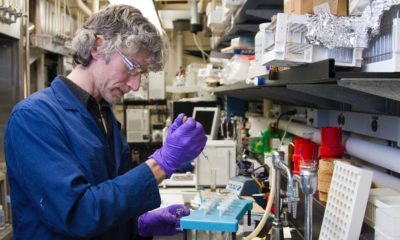Biotech
Tollys raises €2.3 million in a series A financing round
The biotech company Tollys has recently announced a $2.53 million (€2.3 million) Series A financing round. The funds raised will be used to advance the preclinical development of TL-532. It induces apoptosis death of cancer cells, thereby releasing a myriad of tumor-specific antigens, while activating the immune system to generate a T cell response against these tumor antigens.

Tollys, which is developing TL-532, the first anti-cancer immunotherapy based on a synthetic agonist specific for the Toll-like receptor 3 (TLR3) receptor, has just announced a $2.53 million (€2.3 million) Series A financing round. This fundraising is bringing the total amount raised by the company since its creation in 2015 to $7 million (€6.4 million). The preclinical proof of concept for TL-532, which supports its development for clinical trials, was the key factor in winning the investors’ support.
The historical shareholders were joined for this round by new private investors. The funds raised will be used to advance the preclinical development of TL-532. In particular, Tollys will use the financing to produce TL-532 and to initiate the regulatory safety studies required prior to clinical trials in bladder cancer planned for late 2021/early 2022.
If you want to find out more details about Tollys Series A funding, how the biotech company plans to use the money for the development of the TL-532 receptor and to read the most important business headlines in the world, download the Born2Invest mobile app.
The Board of Directors was extended with three new members
Three new members of the Board of Directors join Jacques-François Martin, President of Tollys. They are Dr. Dino Dina, former CEO of Dynavax and Chiron Vaccines, Mr. Philippe Goupit, a veteran of the biotechnology and pharmaceutical industry, and Ms. Céline Baque Saint-Olive, CEO of Noraker, representing some of Tollys’ private investors.
“Tollys is delighted to have the support of its investors for this Series A and to welcome three experienced executives to its Board of Directors,” said Jacques-François Martin, President of Tollys. “This is a clear signal of support for our company, our vision and our ability to fulfill our commitments for TL-532, a novel cancer immunotherapy that has shown great promise.”
TL-532 is a TLR3-specific agonist with a triple mechanism of action
TL-532 induces apoptosis death of cancer cells, thereby releasing a myriad of tumor-specific antigens while activating the immune system to generate a T cell response against these tumor antigens. In addition, it alters the tumor microenvironment by producing cytokines and chemokines, which prevent tumor development. The newly created T-lymphocytes then destroy the remaining cancer cells and prevent cancer from coming back via a vaccination mechanism.
The TLR3 receptor is a validated target in oncology, but no TLR3 agonists are commercially available at this time. TL-532 is the first synthetic TLR3 agonist with a fully defined double-stranded RNA sequence, facilitating its production. As a result, TL-532 has best-in-class potential and is the first of its kind on the market.
“Securing the support of our investors for this A-series is an important step in the development of the company, and moves us into the next exciting phase, the preparation of the first clinical trials,” said Vincent Charlon, CEO of Tollys. “Patients with non-muscle-invasive bladder cancer where standard BCG treatment has failed need more effective treatment options to avoid having to undergo radical cystectomy. TL-532 will be administered intravesically, following a procedure well known to urologists.”
Every year, 430,000 patients worldwide are diagnosed with bladder cancer, 90% of which are non-muscle-invasive bladder cancers (NMISBC). The current standard treatment is transurethral tumor resection followed by BCG therapy. In 70% of cases, BCG therapy fails or patients experience a relapse. In the absence of other treatment options, radical cystectomy is recommended to eliminate bladder cancer.
__
(Featured image by madartzgraphics via Pixabay)
DISCLAIMER: This article was written by a third party contributor and does not reflect the opinion of Born2Invest, its management, staff or its associates. Please review our disclaimer for more information.
This article may include forward-looking statements. These forward-looking statements generally are identified by the words “believe,” “project,” “estimate,” “become,” “plan,” “will,” and similar expressions. These forward-looking statements involve known and unknown risks as well as uncertainties, including those discussed in the following cautionary statements and elsewhere in this article and on this site. Although the Company may believe that its expectations are based on reasonable assumptions, the actual results that the Company may achieve may differ materially from any forward-looking statements, which reflect the opinions of the management of the Company only as of the date hereof. Additionally, please make sure to read these important disclosures.
First published in MyPharma EDITIONS, a third-party contributor translated and adapted the article from the original. In case of discrepancy, the original will prevail.
Although we made reasonable efforts to provide accurate translations, some parts may be incorrect. Born2Invest assumes no responsibility for errors, omissions or ambiguities in the translations provided on this website. Any person or entity relying on translated content does so at their own risk. Born2Invest is not responsible for losses caused by such reliance on the accuracy or reliability of translated information. If you wish to report an error or inaccuracy in the translation, we encourage you to contact us.

-

 Fintech2 weeks ago
Fintech2 weeks agoMuzinich and Nao Partner to Open Private Credit Fund to Retail Investors
-

 Fintech21 hours ago
Fintech21 hours agoRipple and Mercado Bitcoin Expand RWA Tokenization on XRPL
-

 Crypto1 week ago
Crypto1 week agoBitcoin Traders on DEXs Brace for Downturn Despite Price Rally
-

 Crowdfunding6 days ago
Crowdfunding6 days agoFrom Confiscation to Cooperation: Funding Casa de la PAZ’s Social Transformation
























